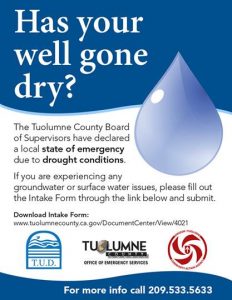On Potable Water, Drought-Hit Well Relief
Sonora, CA – Local water officials say, as prospects dwindle for much more in the way of rain this summer, residents with wells in danger of failing should ensure their contingency plans are safe.
Although many residents are still unaware, through an inclusive state-funded emergency drought-relief program, Tuolumne County residents with dry or impacted wells may be eligible to receive free use of a temporary water storage tank and or potable water deliveries. About a dozen residents so far whose locations were close enough to existing Tuolumne Utilities District (TUD) infrastructure have alternately received temporary water connections. The program operates collaboratively through the county, using TUD as the local water provider, and the nonprofit Amador Tuolumne Community Action Agency (ATCAA), to administer the tank and water deliveries.
Recently, Darrell Slocum of ATCAA cautions that there have been at least two instances where residents, unaware of the emergency water program, purchased water on their own in the open market that was unsafe for sanitation and consumption. As it turned out, “When we inspected the water, we determined that it was not potable water…and in both of those instances, the water had been delivered by a non-certified hauler.”
Slocum cautions residents who plan on purchasing their own water supplies that currently the Department of Public Health lists only two licensed certified water haulers in Tuolumne County; Mike McConnell Construction and the Confidence Ridge Company, both of Sonora. (Click here for the state list).
Tapping Water Supplies
While there are a number of variables involved in qualifying for the inclusive state-funded relief program, Slocum says the primary considerations are that either the well(s) on-site are dry or that the quality and or quantity of the water supplies are not able to serve residents’ needs. “An assessment can be done over the phone and the next step is an on-site inspection to determine if the site is eligible,” he explains. “For the most part, if the location is determined to be eligible, the tank and water deliveries [costs] are covered by state.” He indicates that landlords, in some cases, may be required to incur some expense. Without the subsidy, residents would face tank purchase costs that might run into the thousands, along with an estimated $350 per each water delivery, according to Slocum.
For those who qualify, Slocum says that ATCAA can either install a tank and make water deliveries into it or deliver into a resident’s existing tank. “When we do that, we take steps to assure that the water is potable and suitable for sanitation and consumptive purposes,” he adds. “We do that by making sure that the source of water, which is TUD, meets all the requirements for potable water and we use a certified water hauler to deliver the water and put it into the tank.”
To date, in excess of 215 wells in the county have been identified as having gone dry, according to Slocum. In some of the cases, he says, owners have drilled either deeper or new wells. Currently, 50 households are receiving water deliveries or have gotten an emergency connection to TUD. With little expected rainfall to recharge low level wells, he expects the program will be receiving more referrals. Those interested in applying for the program, may access the form by clicking here.

